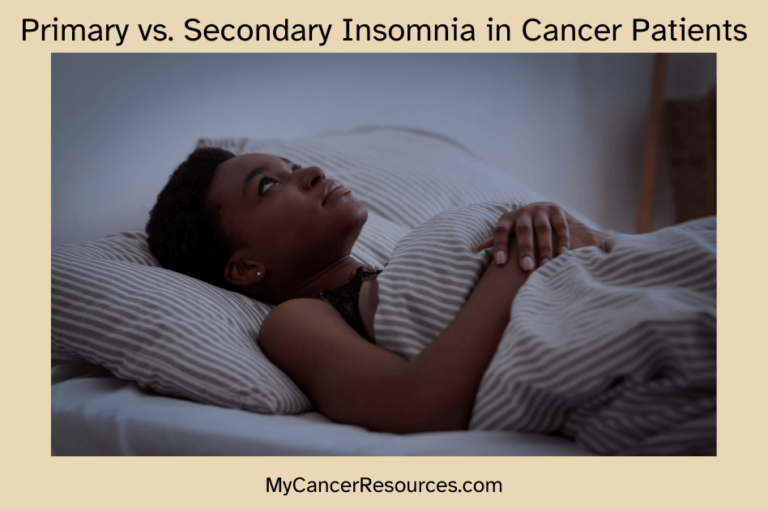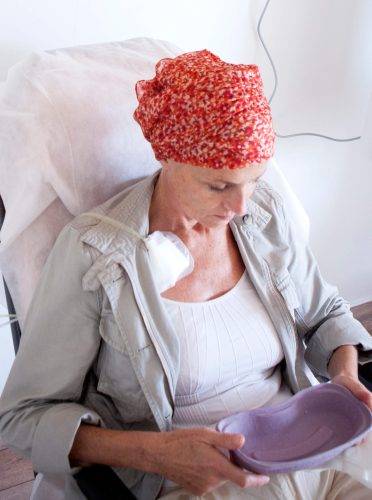
You might have had your fair share of nights tossing and turning since your cancer diagnosis.
Staring at the ceiling while the clock ticks away, stressing about treatment to side effects to relationships and finances.
This is common for many dealing with cancer – between 30 and 50% of people with cancer experience insomnia (problems sleeping).
One study showed that insomnia rates are nearly three times higher for people with cancer than in the general population.
For some, high rates of insomnia symptoms linger for several years after treatment ends. This means insomnia and the health problems that a lack of sleep can lead to can cause ongoing issues for a very long time.
There are 5 main types of insomnia:
Acute insomnia is short-term, lasting from just a few days up to a month. This is often triggered by a change in environment, pain, or stressful events like relationship issues, work or school deadlines, or a medical diagnosis like cancer.
Chronic insomnia is when someone has problems sleeping at least three days a week for at least a month.
Onset insomnia is problems falling asleep. This can be acute or chronic.
Maintenance insomnia is when you have troubles staying asleep or waking too early and finding it hard to fall back asleep.
Behavioral insomnia of childhood is sleeping difficulties in children, most often with falling asleep. We won’t cover this type in this blog post.
People with cancer can suffer from both acute and chronic insomnia, and it can be classified as primary vs secondary insomnia.
Primary insomnia is not caused by other health issues, and secondary insomnia is caused by health conditions, or side effects from medical treatments, like chemotherapy.
Symptoms and Consequences of Insomnia
Insomnia is a broad spectrum of sleep problems. It’s not just twisting and turning, struggling to fall asleep or waking up in the middle of the night, unable to fall back asleep.
Insomnia affects both the quantity and quality of sleep. It doesn’t just steal your night’s rest; not getting enough sleep leaves you feeling exhausted and irritable the following day.
Insomnia can cause excessive daytime sleepiness, intense fatigue, brain fog (and on top of chemo brain, that can be a real bear to deal with!), mood swings, and cognitive impairment.
It can also lead to health problems like high blood pressure and heart disease.
Insomnia can also weaken your immune system. Since your immune system might already be struggling as a result of cancer treatment, this shows just how important it is to treat insomnia so your body can be at its peak condition to kill off cancer cells.
Primary vs Secondary Insomnia: The Differences
Primary insomnia is not related to a health condition or psychiatric disorders. It often emerges as a result of life’s pressures, leaving you lying awake.
Stress ranging from worrying about a to-do list, anxiety about an upcoming scan or appointment, or changes to your sleep habits are all risk factors for developing primary insomnia.
Environmental factors also play a big role in primary insomnia, from jet lag to the bright light from your devices like phones or TVs before bedtime or the constant noise from city streets, these can make it hard to settle in for a restful sleep.
Lifestyle habits can also contribute to primary insomnia. These include eating spicy foods, drinking caffeine, or exercising too close to bedtime.
People who work rotating shifts have high rates of circadian rhythm disorders. This means their body’s natural clock cannot sync with day and night, and they can struggle with sleep too.
Secondary insomnia, however, is a symptom or side effect of other health issues. Conditions like anxiety and depression, heart disease, gastroesophageal reflux disease (GERD), chronic pain and sleep apnea frequently lead to sleep problems. There are also a lot of cancer-related factors that can lead to secondary insomnia.
Cancer-Related Insomnia
Besides being a majorly stressful life event, cancer and its treatment can be causes of chronic insomnia.
Cancer-related factors that can lead to sleep problems include pain, headaches, distress, hospital stays, side effects of surgeries and treatments, anxiety and depression.
Those who already struggled with sleep can find that insomnia gets worse after a cancer diagnosis.
Patients who receive radiation can have more sleep disturbances than those who don’t have radiation therapy.
Some medicines that help with other cancer treatment-related side effects like nausea and vomiting have their own side effects, including insomnia.
Antidepressants can also affect sleep. Steroids can also be prescribed during treatment, and those too, disturb sleep patterns.
Many find it can be a catch-22: either lose sleep because you feel nauseous and are up vomiting, or take medicines to help curb the nausea and vomiting, but lay awake all night because those medicines make it hard to sleep.
Those receiving hormonal therapy can have increased hot flashes and night sweats. So people with breast cancer or prostate cancer receiving hormone therapy often report trouble sleeping because they wake up throughout the night and may stay awake for a long time trying to cool off and settle back down to sleep.
A number of people with cancer also experience restless leg syndrome, which makes the legs uncomfortable and even painful.
People with RLS have an uncontrollable urge to move their legs, which can reduce pain and discomfort, but this can keep them awake as they fight to overcome the tingling, crawling and pulling sensations in the calves, thighs and feet.
Finding a comfortable sleep position with a port may be difficult as you’re still healing, and that can also keep you awake.
Who's at Risk?
In general, older people and women of all ages, but especially from perimenopause through post menopause tend to be those who struggle with sleep the most.
However, this isn’t always the case with people with cancer.
The study previously mentioned in this post did not find significant differences between age groups or genders. Researchers did find that certain types of cancers had higher rates of insomnia than others.
Lung cancer patients were found to have the highest rates of insomnia. This can be because it may be harder for them to take deep breaths or due to frequent coughing spells.
Other types of cancer with higher rates of insomnia included non-Hodgkin’s lymphoma, bladder, colorectal, stomach, prostate, breast, cervix and liver cancers.
Diagnosing Insomnia
For most of the general population experiencing insomnia, the official diagnosis can take longer than those with cancer.
This is because insomnia is such a common side effect of both the disease and treatments including chemotherapy, radiotherapy and hormonal therapies.
However, your doctor may want you to go through the formal process of diagnosis, which includes a both a physical examination and a deep dive into your medical history.
This medical review explores all medical issues you’re currently having or have experienced at any point in your life, whether you have chronic stress, or have been diagnosed with any mental disorder.
Your sleep history will also be evaluated, along with your history of substance abuse or alcohol use.
You may have lab work done to see if there are any other underlying conditions that may be contributing to your sleep problems.
They may ask you to complete a sleep diary, which is where you track your sleep patterns and issues over weeks.
Sometimes, sleep specialists may want you to be admitted to the hospital for an overnight sleep study so your breathing can be monitored and you can be examined for any other potential causes of insomnia.
Again, these steps to diagnosis are more common for people without cancer who are struggling with sleep.
Since up to half of the population of cancer patients experience insomnia during treatment and survivorship, steps like the sleep diary and overnight sleep study may be skipped so that interventions can be recommended and started earlier.
Exploring Treatment Options
If you’re experiencing insomnia, you might feel trapped in a cycle of restless nights and weary days. The good news is that there are a number of treatment optiosn you can explore to get some relief.
- Lifestyle changes are often the first-line treatment recommendation when a patient reports problems with sleeping. They include establishing a regular sleep schedule, optimizing your sleep environment (which is called sleep hygiene), and limiting exposure to screens before bedtime.
Though treatment related fatigue may make you want to take naps throughout the day, it may be better to try to go a few days without napping to see if that helps improve your sleep at night.
Some swear by using honey for insomnia or drinking banana tea to improve sleep. More research has been done demonstrating the benefits of honey on sleep and while less formal research has been done on banana tea and sleep, anecdotal evidence shows that it too, can help.
It certainly may be worth incorporating these into your nighttime routine to see if it helps improve your total sleep time.
These are just a few options. Many more research-based recommendations are discussed in my ebook, Improving Sleep During Cancer Treatment and Beyond.
For many, the simple adjustments I share in my book spark significant improvements in sleep quality. - Cognitive Behavioral Therapy (CBT) is a powerful behavioral intervention tool, and an excellent option to address some of the underlying causes of insomnia without medication.
Because of its effectiveness, this type of therapy is often recommended before doctors move to prescribing medication.
By teaching relaxation techniques and how to implement good sleep habits and reshaping thought patterns about sleep or stressors, cognitive-behavioral therapy has helped many people get restorative sleep.
Your cancer treatment center may have a licensed psychologist or licensed clinical social worker who can provide CBT in a brief session while you’re already at the clinic for an appointment or getting treatment.
With telehealth becoming more popular and widely available, you may even be able to find a therapist to work with you over a video call from your home, eliminating the need to leave home for yet another medical appointment. - Medical interventions take your care a step further. Your health care provider may recommend that if you’ve been prescribed steroids that you take them in the morning, or at least before lunch.
Prescription medications like Ambien, Restoril or Lunesta may be prescribed for you to try.
For those experiencing restless leg syndrome, your healthcare provider may take a blood test to check your iron and vitamin levels.
They may recommend adding iron, folate or vitamin B12 to your diet or through supplements. They may also connect your with a physical therapist to teach you daily stretching exercises to help relax your muscles.
If additional medical intervention is needed for your restless leg syndrome, nerve blockers like gabapentin, opioid-based pain relievers or even Klonopin, which was developed to help reduce seizures, but also has a soothing effect on nerves, may be prescribed.
It is important to remember that treatment for insomnia is a personalized journey. What offers relief for one person might not work for another. You may need to try a number of options to find what works best for you.
Most of the time, a combination of lifestyle changes, therapy, and prescription drugs are used for people with cancer to improve sleep quality and increase the amount of sleep they get at night.
It is important to communicate with your medical team (which may also include sleep specialists) on your symptoms of insomnia and the affect it is having on your life.
Collaborating with healthcare providers ensures the most effective strategies are in place. If something isn’t working, they can pivot and change their approach, so that you can find relief as quickly as possible.
Long-Term Management of Insomnia
Managing insomnia long-term requires persistence, patience and consistency. Your insomnia may improve after your cancer treatment ends, or it may stick around, causing long term struggles with sleep.
The strategies that seem to work may not be as effective over time, so you may need to adjust your habits or medication to find a new treatment plan. Changes you may need to make include:
- Adapting your environment to promote relaxation can make a significant difference. This might mean reevaluating your pre-bedtime habits or even reconsidering the layout of your sleep space, or buying a different mattress or pillows.
- Maintaining a sleep diary offers invaluable insights into patterns or behaviors that could be undermining your efforts to find sleep
- Exploring clinical trials for new insights and treatments can also open doors to innovative approaches that you and your healthcare provider might not have considered previously.
Final Thoughts
Insomnia can be a distressing part of cancer treatment, from diagnosis through survivorship. The good news is that there are a number of proven approaches that can help provide relief and give you back the restful sleep you’ve been dreaming of.
It may take a while to find the right combination of strategies that work best for you, but keep at it.
Check out my ebook, Improving Sleep During Cancer Treatment and Beyond for practical, research-backed tips you can implement today to help provide relief.
Let me know which tip works best for you!



